INTERFERON BETA-1A - SUBCUTANEOUS INJECTION
PHONETIC PRONUNCIATION: (IN-ter-FEER-on BAY-ta-wun-ay)
COMMON BRAND NAME(S): Rebif
GENERIC NAME(S): interferon beta-1a/albumin human
Uses
USES: This medication is used to treat multiple sclerosis (MS). Interferon is not a cure for MS, but it may help to slow disease worsening and decrease flare-ups of symptoms (such as balance problems, numbness, or weakness).
How to use INTERFERON BETA-1A - SUBCUTANEOUS INJECTION
HOW TO USE: Read the Medication Guide and Instructions for Use provided by your pharmacist before you start using this medication and each time you get a refill. If you have any questions, ask your doctor or pharmacist. If you are using this medication at home, learn all preparation and usage instructions from your health care professional. Before using, check this product visually for particles or discoloration. If either is present, do not use the liquid. Learn how to store and discard medical supplies safely. To increase comfort, remove this medication from the refrigerator and let it warm to room temperature for about 30 minutes before injecting. Do not warm up this medication in any other way such as heating in the microwave or placing in hot water. Inject this medication under the skin as directed by your doctor, usually 3 times a week, at least 48 hours apart (such as Monday, Wednesday, and Friday). It is best to use this medication near bedtime to reduce side effects. Before injecting each dose, clean the injection site with rubbing alcohol. Change the injection site each time to lessen injury under the skin. Do not inject into skin that is red, sore, scarred, or infected. Inject this medication in the thigh, abdomen, buttock, or the back of the upper arm as directed by your doctor. Tell your doctor of any skin reactions that do not go away after a few days. The dosage is based on your medical condition and response to treatment. To reduce your risk of side effects, your doctor may direct you to start this medication at a low dose and gradually increase your dose. Follow your doctor's instructions carefully. Use this medication regularly to get the most benefit from it. To help you remember, use it at the same time for each scheduled dose. Tell your doctor if your condition gets worse.
Side Effects
Precautions
Interactions
Overdose
Images
Reviews
Faq for INTERFERON BETA-1A - SUBCUTANEOUS INJECTION
Interferon beta-1a is a medication used to treat multiple sclerosis (MS). It belongs to a class of drugs known as immunomodulators.
Interferon beta-1a works by reducing inflammation in the central nervous system, which is believed to play a role in the development of MS. It helps to decrease the frequency and severity of relapses, as well as slow down the progression of disability.
Interferon beta-1a is typically injected subcutaneously (under the skin) using a pre-filled syringe or an autoinjector device. It is usually administered every other day or three times a week, as recommended by your healthcare provider.
Common side effects of interferon beta-1a may include injection site reactions (redness, pain, or swelling), flu-like symptoms (fever, chills, muscle aches), fatigue, headache, and nausea. These side effects are usually mild and improve over time.
Yes, many patients are trained to self-administer interferon beta-1a injections at home. Your healthcare provider will provide detailed instructions on how to properly administer the injections and monitor your progress.
The effects of interferon beta-1a may vary from person to person. Some individuals may experience a reduction in the frequency and severity of relapses within three to six months of starting the treatment, while others may take longer to respond. It is important to continue the medication as prescribed and discuss any concerns with your healthcare provider.
The use of interferon beta-1a during pregnancy or breastfeeding should be discussed with your healthcare provider. While there is limited data available, it is generally recommended to avoid using interferon beta-1a during pregnancy unless the potential benefits outweigh the risks.
If you accidentally miss a dose of interferon beta-1a, administer it as soon as you remember. However, if it is close to the time of your next scheduled dose, skip the missed dose and continue with your regular dosing schedule. Do not double the dose to make up for a missed one.
Interferon beta-1a should be used with caution in individuals with a history of depression or other mood disorders, liver problems, thyroid dysfunction, or seizures. It should not be used in people with known hypersensitivity to interferon beta-1a or other interferons.
Disclaimer
IMPORTANT: HOW TO USE THIS INFORMATION: This is a summary and does NOT have all possible information about this product. This information does not assure that this product is safe, effective, or appropriate for you. This information is not individual medical advice and does not substitute for the advice of your health care professional. Always ask your health care professional for complete information about this product and your specific health needs.
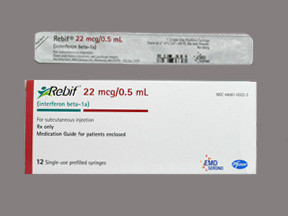
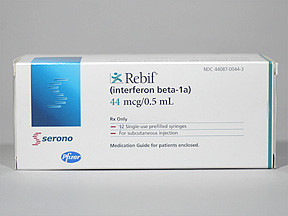
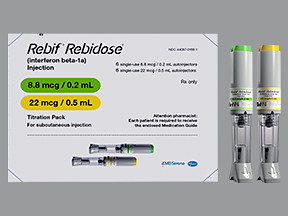
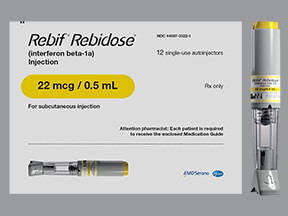
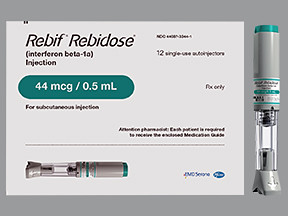
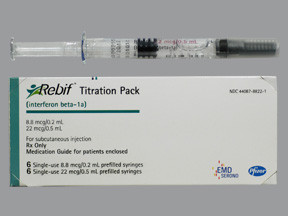
No Reviews Yet